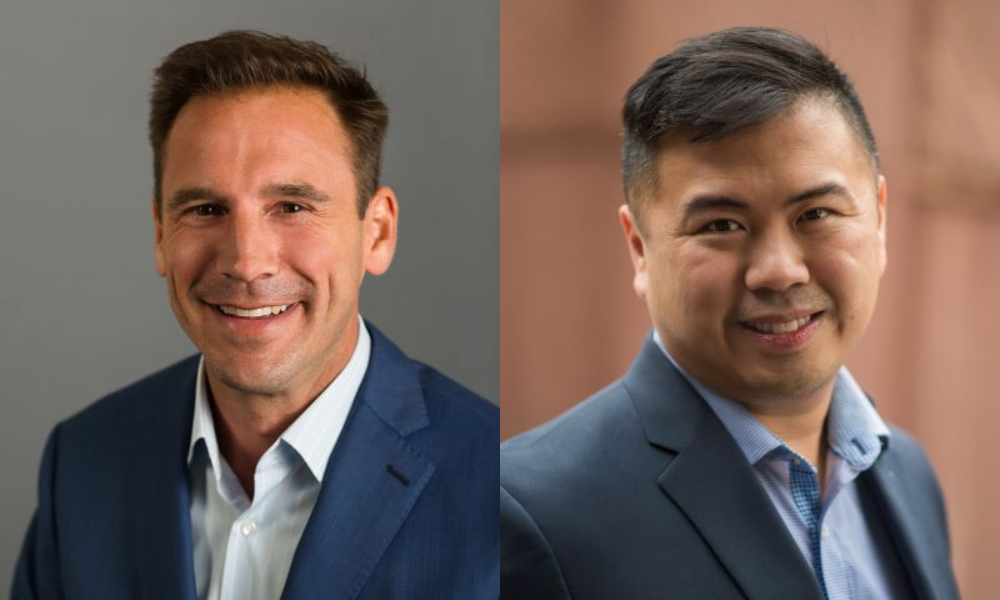Despite advances in technology, top advisor argues there's no replacing the human touch

Over the past two years, advances in tech adoption have allowed advisors to engage with clients like never before. But even with the leaps and bounds made in virtual communication, one top advisor maintains there’s nothing like the real thing.
“I feel like there isn't any more personal touch than having that face-to-face contact,” says Jamie Suprun, senior wealth advisor at Suprun Wealth Management with iA Private Wealth. “I have found that the majority of my clientele want to have those discussions face to face.”
Suprun (pictured above, left) runs an independent practice based in Simcoe, a world away from the traffic snarls and parking-space shortages that plague the GTA. That’s made in-person meetings easier, but it doesn’t mean technology isn’t a factor in the business.
“I have clients that live three hours away, or live out of province. I also have clients that vacation out-of-country. I have Zoom calls with them,” Suprun says. “And I do have colleagues who only do video calls, and they’re successful.”
There’s no denying that technology has changed the client communication game. Aside from talking to clients remotely and in real time, digital technology allows financial advisors to automate and personalize their social media marketing based on their clients’ interests, as well as coordinate meetings through automated calendaring.
“According to a recent study by Salesforce, one of the top reasons why clients leave an advisor is lack of communication. That was cited by 30% of clients in the study,” says Joseph Lo, vice president, Wealth Product Innovation at Broadridge (above, right).
“A recent study by Broadridge’s AdvisorStream and Dow Jones also found one of the top reasons Canadian investors chose to work with an advisor was for their level of communication, underscoring the importance of consistent communications to client retention and growth.”
While Suprun acknowledges there have been great strides in tech-driven communications, there are still speed bumps. Lagging audio and frozen screens, he says, are a regular frustration when trying to educate clients.
“Humans are inherently personal beings, and it can be very difficult to get a point across when you’re talking remotely, even using Zoom or Teams,” he says. “I always feel like when we’re doing video calls, there's a time limit on those conversations.”
For Suprun, meeting clients in person allows him to shift gears based on the situation – whether they seem distracted or confused, for example – or the teaching style that’s most effective for them. The ability to get a point across and get into the weeds, he says, is especially critical when it comes to tax and estate planning.
The need to engage clients in different ways is also evident at Broadridge. According to Lo, there’s a rising appetite among advisors for tools with ad-hoc video and screen-sharing capabilities. And given the tighter focus on KYC and KYP brought by the client-focused-reforms, the ability to share documents seamlessly with investors through the cloud is now table stakes.
“We’re seeing increased adoption of dynamic planning tools, where the advisor can share a screen with the client, and they can adjust elements on the fly as the conversation continues,” Lo says. “These digital tools can also be used in person, so they’re actually enhancing personal conversations as well.”
With the arrival of ChatGPT, Lo also sees new doors opening for advisors to serve their clients better. While advisors typically have one or two areas of specialization – insurance planning, retirement planning, or portfolio management, for example – he says the AI of ChatGPT could be used to connect those disparate elements to deliver more holistic support.
“I think advisors could also potentially ask ChatGPT for ways to understand their clients’ circumstances better,” Lo says. “You can imagine an advisor getting ready for a quarterly portfolio review meeting with a client, and they can use AI to come up with a priority list of discussion points, as well as a summary of meeting points after it’s over.”
Suprun agrees technology can and has reshaped wealth management. But fundamentally, it won’t replace people’s need for personal connection.
“It's not like we're living in the stone age here. But eye contact, body language, and reading the room is by far the easier way to communicate,” he says. “I don't think there's any better way of communicating than face to face.”



